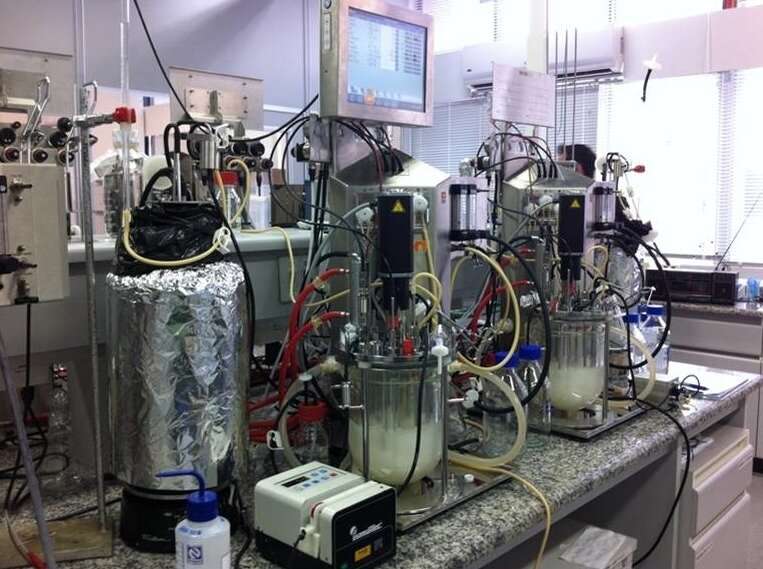Study paves way to more efficient production of 2G ethanol using specially modified yeast strain

A Brazilian study paves the way to increased efficiency of second-generation (2G) ethanol production based on the discovery of novel targets for metabolic engineering in a more robust strain of industrial yeast. An article on the study is published in the journal Scientific Reports.
The databases compiled by the authors are at the disposal of the scientific community in the repository of the State University of Campinas (UNICAMP), which is a member of the Dataverse Project, an international collaborative initiative.
First-generation (1G) ethanol is produced from sources rich in carbohydrates (such as sucrose), especially sugarcane in the Brazilian case. Processing of sugarcane generates large amounts of fibrous residues, such as bagasse, which can be used to produce steam and electricity in power plants. These residues are rich in cellulose and hemicellulose (polymeric carbohydrates that maintain the mechanical strength of plant stem cell walls), which can be used to produce 2G ethanol via conversion into smaller molecules for fermentation by yeast and other microorganisms.
The main challenge in 2G ethanol production is conversion efficiency since cellulose and hemicellulose are hard to hydrolyze. The first step has to be the removal of tough, stringy lignin, which is basically fiber, to make the simple sugars located in the cellulose and hemicellulose available to the yeast. This is costly, consumes a great deal of energy, and releases substances that can inhibit the fermentation process.
“2G ethanol production still requires optimization to increase efficiency. One of the approaches needed entails the identification of yeast strains that resist spoilage by inhibitory molecules derived from the processing of these residues,” said Marcelo Mendes Brandão, last author of the article and a researcher at UNICAMP’s Center for Molecular Biology and Genetic Engineering (CBMEG). “Some industrial yeast strains are known to have higher levels of tolerance of these compounds. A well-documented example is Saccharomyces cerevisiae SA-1, a Brazilian industrial strain for fuel ethanol that has shown high resistance to inhibitors produced by the pretreatment of cellulosic complexes. This strain was the focus of our study.”
Methods
The experiments were performed by first and second authors Felipe Eduardo Ciamponi and Dielle Pierotti Procópio, both of whom were Ph.D. candidates at the time, in a collaboration involving the laboratory led by Thiago Olitta Basso, a researcher at the Department of Chemical Engineering of the University of São Paulo’s Engineering School (POLI-USP), and Brandão’s lab at CBMEG-UNICAMP.
“To put this study in the context of research on 2G ethanol, we knew certain strains of S. cerevisiae were resistant to these inhibitors, but the molecular mechanism they use to achieve this resistance is complex, involving multiple processes and regulatory pathways,” Basso said. The study focused on p-Coumaric acid (pCA), one of the main inhibitors present in sugarcane bagasse after processing. “The data available in the literature shows that pCA inhibits biomass yield and lowers the performance of this yeast strain in 2G ethanol production.”
To understand how the yeast responded to the culture medium, the researchers decided to use a multiomics-based approach combined with bioinformatics to integrate analysis of the transcriptome—the full range of messenger RNA (mRNA) molecules expressed by the organism—with quantitative physiological data. Their aim was to arrive at a molecular and physiological characterization of the yeast’s response to this key inhibitor.
Procópio and Ciamponi conducted the biological experiments at POLI-USP’s BioProcessing Laboratory (BELA) using continuous culturing in chemostats, a type of bioreactor in which the physiological and chemical conditions are tightly controlled, enabling them to isolate transcriptomic alterations that arose in response to the presence of pCA without interference from other variables influenced by environmental conditions.
Samples of steady-state S. cerevisiae SA-1 cultured in anaerobic chemostats with and without pCA were collected to determine physiological parameters. Part of the material was sent to Taiwan for RNA sequencing. The results, which were analyzed at CBMEG-UNICAMP’s Integrative Systems Biology Laboratory, showed that the biological mechanisms used by the yeast strain to survive under the influence of this inhibitor are even more intricate than previously thought.
The quantitative physiological data suggested that the yeast tended to increase sugar and ethanol yield when exposed to pCA stress under anaerobic conditions (relevant to the industrial process).
Brazil has advanced in research on ways of leveraging its outstanding biodiversity to optimize biomass yields in the manufacturing of bioproducts—consumer goods that can be built, assembled or produced by converting part of an organism, as in the case of plant tissue and fiber, or by capturing their metabolites. “An example is production of fuel ethanol, a commodity with significant impact on the Brazilian economy,” Brandão said.
More information:
F. E. Ciamponi et al, Multi-omics network model reveals key genes associated with p-coumaric acid stress response in an industrial yeast strain, Scientific Reports (2022). DOI: 10.1038/s41598-022-26843-2
Citation:
Study paves way to more efficient production of 2G ethanol using specially modified yeast strain (2023, March 27)
retrieved 27 March 2023
from https://phys.org/news/2023-03-paves-efficient-production-2g-ethanol.html
This document is subject to copyright. Apart from any fair dealing for the purpose of private study or research, no
part may be reproduced without the written permission. The content is provided for information purposes only.
For all the latest Science News Click Here
For the latest news and updates, follow us on Google News.

